- Home
- neetha Napew
Forbidden Land Page 17
Forbidden Land Read online
Page 17
He had no appetite for this antelope. Mahnie would save his portion for him. Later he would feed it to the one member of the hunting team who had not received his full share of the credit for the kill. Brother Dog would be grateful.
As darkness settled upon the world, the people feasted, roasting the muscle meat of the antelope and picking clean the bones of the ptarmigan and hare. Later they would feed the remnants to the flames and lay the head of the antelope to singe upon the coals, then bury it in the ashes; by morning it would make a tasty meal.
It was a moonless night, but a night alive and shivering with stars. Their positions were changing with the season, but the new star was still there, always watching them.
Lonit watched it back. She sat with the other females at the women’s side of the fire, using her special tiny scoop of bone to scrape the last oily, precious bits of blood-rich marrow from a leg joint that Torka had cracked and presented to her. Both Eneela and she, as nursing females, had been given generous and coveted portions because their men were thoughtful.
She smiled to herself. Had Torka ever been anything else? Her smile faded. If only Karana would be half so considerate of Mahnie! Poor girl. Look at her sitting by herself, eating nothing. She loves him so. This woman will talk to him. Magic man he may be, but he is so young! It is time that this woman explained to him that his woman needs more than the meat of his kills to be nourished. She must have her man’s affection, as well.
She looked off to where Karana sat on a stony rise, silhouetted against the night with Brother Dog. Man and dog, almost always apart from the band these days. Why? What troubled him so?
She would have risen and gone to him, but in that moment little Umak made a happy, smacking sound and distracted her from her purpose. Her son’s swaddling moss had been changed, his bottom cleansed, and now he was hungrily at her bosom again. What a fine, healthy, ever-hungry son he was! She looked down at him. Her nursing tunic lay partially open. Beneath the shining light of the stars, Umak’s little face shone of oil and good care and satisfaction.
Contentment suffused her as she turned her eyes to the heavens and focused on the new star. But gradually, as she watched it, her happiness faded. Two sons. Lonit has two sons! One is lost and far away, abandoned toNo! She would not long for him! She would not allow her breasts and arms and heart to ache for him. She would not think of him. Manaravak was dead. Why, then, knowing this, did her spirit continue to plague her with the agony of feeling that somehow he was alive, crying for his mother’s love?
Her longing nearly choked her. What an ungrateful creature she must seem to the forces of Creation to grieve so long for a lost child when she had Summer Moon, Demmi, and tiny Umak to comfort her.
With a sigh, she turned her gaze upward again and tried to concentrate on the star. “Umak’s star”—that was what Torka had come to call it, and if she squinted, its light filtered through her lashes and looked just like ... a maned, leaping lion with a pelt of white-hot fire.
Lonit felt suddenly cold. The star looked like the lion that had roared within her as she had labored to give birth to Umak. Why did it seem to threaten her? Why did she fear it? Why did she instinctively draw her infant close whenever she thought of it?
Could it be because she saw not the image of a lion but of a man in its wild, savage beauty—a savage, magnificent man dressed entirely in the white skins of winter-killed caribou, with the white feathers of an Arctic owl shimmering in his mane of raven-black, knee-length hair ... a magic man who showed the bone-white, serrated teeth of a beast when he laughed and danced and whirled maniacally in the starlight of her memories, roaring in defiance of the traditions of his ancestors as his chanting set fire to the night .. . and to her body before he raped her.
Navahk. Navahk was the lion that haunted her dreams! Navahk was the lion in the sky! Navahk was .. . the father of her son?
“No!” she cried out just as Umak’s nubbin teeth bit deep. She was so distraught that her fist curled around the marrow scoop and snapped it in two.
Beside her, lana smiled benignly, assuming that Lonit’s exclamation had been the result of little Umak’s excessively zealous nursing.
In the distant ranges wolves and wild dogs began to bark and yip in excitement and anticipation of the coming hunt. At the edge of the camp, Brother Dog howled as if in answer to his kindred.
“Listen,” urged Torka from the men’s side of the fire. His strong, even features were defined by the flames, and his eyes rested steadily on Lonit’s face, as if he spoke to her alone, “Wolves and dogs are leaving their winter denning sites to gather into packs. They know that the herds are returning to feed them and their children, as they will also feed us and ours.”
Lonit stared at him. Ours. Our daughters. Our son.
“Yes!” Her affirmation was as bold as the sound of the wolves. Our son. Torka and Lonit’s son! Not Navahk’s. It can be no other way!
They walked on and on. Ice crystals danced in the light of day, and although it was spring, with days that were gradually warming, the mammoth crossed a still-frozen river. The people followed.
Now the mountains loomed ahead. Awestruck and intimidated, the band stopped and stared. Before them, the familiar tundral steppe land yielded to bare, scabrous foothills bisected by outwash streams thick with willow scrub. It was not the hills that held their gaze, however. Beyond the hills, encircling the entire eastern horizon, the mountains were ice-ridden walls that seemed to hold up the sky.
They had walked silently for days now in the presence of these great peaks, drawn ever eastward by the mammoth and the tantalizing game-rich stink of the wind. Yet although the stench of game grew stronger the closer they came to the mountains, they found no sign upon the land that the caribou had ever passed this way. And still the mammoth plodded on, without stopping to graze, across the hills and into the shadowy depths of a great pass.
The smell of glaciers—ice and rotten rock—was strong. Beyond the pass lay a big glacier, big enough to block the pass and prevent the caribou from coming through. Torka did not mention the fact; he did not have to—the others were reacting to it as well, as the smell of the still-distant herd mingled in the wind with that of the unseen river of ice.
“So high!” Summer Moon exclaimed, distracting him for a moment. His elder daughter was close by his side, pointing ahead. Never had Summer Moon seen such peaks as these.
“When will the animals come to die upon our spears, Father?” Demmi asked, riding on his hip. “This girl is tired of walking.”
“Demmi does not walk at all!” snapped Summer Moon, looking up at her sister with disgust. “When she is not riding on a sledge, Father carries her!”
Lonit, standing beside Torka, hushed the girls, and Torka was grateful. He was weary, and their bickering was irritating. He, like Demmi, was tired of walking, and it was clear that high, rough, and broken country lay ahead. Unfortunately, if a massive glacier blocked the pass, the people would have to go to the caribou—not only through the pass but across the glacier.
This was a grim prospect, for glaciers were living beasts that ate people and animals and never gave back their bones.
“Perhaps this herd is not for us after aall?” Simu suggested. “Shal we go back into the country where we first lost sign of the old game trails and—“
“Into Cheanah’s hunting ground? Never!” Karana actually shouted at him. “We cannot go back! The great mammoth walks ahead. We will follow.”
Simu stiffened, resentful of the magic man’s admonishment, which shamed him before the others. “This is odd, hungry country for a mammoth. It promises to be hard, dangerous country for our women and children.”
“Life Giver leads us to the herds!” Karana responded hotly. “Life Giver knows the needs of our women and children! There is good browse beyond these mountains, and where there is good browse, there is good hunting!”
“In the wonderful valley?” asked Summer Moon. “Yes,” replied the magic man. “Of co
urse. In the wonderful valley.”
Torka’s brow creased. Karana seemed so sure, as if he had already been over the mountains and back again. And yet, as on the night when they had stood beneath the stars and listened to the wind, there had been a hesitancy and a sound of regret in his voice.
“But so black are these mountains and so big on either side of the pass!” Wallah grimaced as she rubbed her right hip and stared off, not liking the look of the mountains or the pass.
Grek came to stand beside Torka and looked him in the eyes. “These high passes and peaks may be the hunting grounds of wind spirits. There is ice enough upon these mountains to make me think that they will walk. They could fall upon careless travelers.” “We will not be careless,” interjected Karana adamantly.
Torka saw Simu eye the magic man thoughtfully, then he eyed Karana, too. Karana’s passion on the subject was unmistakable and somehow troubling.
“There are other herds,” Simu pointed out quietly.
“No!” Karana’s voice was sharp with warning. “No man can know where he will next find meat—of if he will find it. But the great mammoth spirit—my totem, Torka’s totem—knows, and it has never led us wrongly before.”
“Before?” Simu turned the word into a question of dark portent.
“Never!” Karana corrected himself.
Simu nodded, accepting the magic man’s reply, but when he spoke, it was to Torka. “As this man thinks of the great distances across which we have come with no recent sign of big game, this man remembers that once, in the far country, under a starving moon, there was a tale told by the old men that—“
“This is not a time for the telling of tales!” Karana interrupted irritably, his tone sharper than before.
“Perhaps it is,” replied Sirnu evenly. “For this tale is of the great tuskers, the ancient bull mammoths, and of how, at the dusk of their lives, they wander off to die alone in a far place that lies beyond the Forbidden Land, somewhere beyond the edge of the world, where no man or beast can ever hope to find their bones.”
The little band murmured with apprehension. Torka’s heart went cold as he thought again of the glacier that lay ahead of them. He would never forget the great living glaciers that he had seen in his lifetime—not minor ice fields but mile-thick rivers of surging ice so wide that a man could barely see across them.
“Is this what Simu has come to believe?” Torka asked. “That the great mammoth spirit is not leading us to better hunting grounds but is instead leading us off the edge of the world to die?”
Simu drew in a breath. Everyone in the band did exactly the same thing as they all stared at the young hunter. Simu gulped and seemed to shrink within his furs as he shook his head and looked at Torka with an expression that clearly showed that he had no desire to be the focus of attention or the cause of dissension.
“This man believes nothing,” he said in a tone that was earnest in its need to be understood. “But this man fears-for his woman and for his son.”
“The mammoth will lead us safely through the mountains to the herds!” Karana vowed.
Simu stood tall again. “You have seen this?”
“I have seen this!”
How sure he is, thought Torka, more troubled now than before. Not even the legendary Sondahr or his grandfather Umak had ever been so sure. He looked at Karana, and to his shock, the magic man deliberately averted his eyes. Warning flared within Torka. Something is wrong! He is lying! He has seen nothing. He is afraid to go back!
No! It could not be. In all of the time they had been together as father and son, Torka had never known Karana to be afraid of anything. Yet he was acting so strangely. But then, they were all tired and irritable.
“No more words!” the headman decided. “We will stop in this place. We will eat and rest. Tomorrow two of our number will follow the mammoth into the pass and see what lies ahead.”
“And if a glacier does lie between us and the herds?” Simu wanted to know.
Before Torka could speak, Karana replied emphatically: “The mammoth would not lead us into country that we cannot cross! We must follow. We dare not linger here. We must go now! We cannot go back!”
Torka’s brows expanded across his forehead. There had been unmistakable panic in Karana’s voice. The magic man was afraid, but what did he fear? Surely his terror could not be of Cheanah; in Karana’s short lifetime, he had fought against his own kind before, and whether with spear or dagger, barehanded or with the use of his extraordinary wits, he had always come away the victor. With Torka he had faced lions and wolves, and had even dared to stand against charging mammoths and woolly rhinos.
What could be so terrible to Karana that he would risk not only himself but his entire band to the perils of a glacier crossing rather than return to face it?
No one was certain who heard the lions first, but once they did, all talking stopped. They were on their feet in an instant, drawing their little ones into their arms as their men took up their weapons. Everyone stood with backs to the flames, facing out and listening. The fire spat and crackled as skewered wedges of fat dripped and flamed, consuming themselves as well as their bone skewers because the women who cooked them had lost all interest in food.
“What is the matter?” asked Summer Moon, refusing to be held. “We are not the only ones who hunger in this land,” explained Torka.
“But we have seen no sign of lion,” whispered Eneela, hugging Dak close.
Grek responded to Simu’s woman. “Perhaps as we have been following the herd, the lions have been following us?”
“We are people!” Summer Moon protested, again forgetting that she was only a female child. “People are not meat!”
Lonit hushed her while Demmi, balanced on her mother’s hip, begged in vain to be put down.
Torka appraised his little ones. What bold little creatures they were! But with Lonit as their mother, how could they be otherwise? He would talk to Summer Moon later about remembering her place; but now, in the growing darkness as lions bellowed like booming thunderclaps in the scrub growth between the band and the river, the girl deserved an answer.
“The forces of Creation have made us—man, woman, and child—predator and prey. The lions are hungry, just like you, and they must eat, too. When we eat of the flesh that is the prey of lions, the life force of the animals we eat is in our blood and flesh. And so yes, Daughter, we are meat. Because the forces of Creation have set us to live upon this earth with neither the fleetness of foot of the grazing animals nor the claws and fangs of the flesh eaters, they have made us as wise as we are weak, so that we may have the wisdom to form a circle close to a fire, against which no lion will come.”
They built their fire high and hot that night, lining the little pit with stones to keep the base of the flames well heated, then feeding the fire with all the grasses and scrub growth they could find, plus dried bones saved from many a meal and all the dung the women had gathered across the long miles. The precious fuel should have lasted for many fires to come, but this was a blaze that held the heat of many fires. As sparks rose and flames crackled, the men, at Torka’s direction, stayed vigilant and at the ready with their spears. The people sang bold songs so that the lions would hear their voices and know that those who held fire captive and caused it to leap at their command were strong and unafraid.
Perhaps they sang too boldly. Perhaps their fire leaped too high. Sometime in the night, long after the lions fell silent, the wind turned and the air warmed. In that soft, mellow hour just after dawn has begun to leach the color from the horizon, a great and terrible sound had the people on their feet and staring back at the way they had come.
The ice was breaking up on the river. The spring thaw had come at last. With tumultuous, horrendous force it came, as, from out of a thousand canyons, long-frozen water began to flow.
For days now the melt had been going on—deep in the earth, deep in the mountain snowpack, and deep in the river. It was unseen and unperceived except
perhaps by bottom-dwelling fish or by pikas peeking from crevices on south-facing mountain slopes, where mosses had begun to swell and soften. Sheep, ears back, their senses disturbed by the sound of water running deep and fast within the core of the glacial mass, crossed high on glacier-clad mountain walls, stepping cautiously over slush that had been solid ice only days before.
It began with a drop of water ... a single drop, as clear as air, sweet and swollen from the ice and snow ... a single tear of moisture, weeping with sadness for the winter’s passing, or with joy in hope of the spring to come. It was only one drop, one minute drop, but soon there were two, and then a thousand, and then uncounted thousands, and soon that single bead of moisture was a roaring, erosive force draining from a thousand ice fields, glaciers, and banks of snow until every stream and river in the land was alive with rushing water beneath its skin of winter ice. The frozen river that Torka and his people had crossed with ease was now a living force that grew and grew until its surface ice broke wide and shattered screaming. The foaming waters screamed back beneath broken, crashing, overriding slabs of ice. The floes groaned and whirled and heaved to the surface, only to disappear in clashing, dying tumult as they were swept away by raging waters. The sound of the newly reborn river filled the world and sky, echoing up into the highest passes as winter died.
Karana, standing rigid beside Torka, looked westward across the river and the great distance that lay between him and the far country of Cheanah, where a human child suckled at the breast of a beast, beside a half-human infant that would someday grow to name him Brother.
“We cannot go back,” he said, as if emerging from a dream.
“No,” assented Torka as the others came to stand at his side. “The forces of Creation have spoken. We cannot go back. It seems that the mammoth has led us truly, after all.”

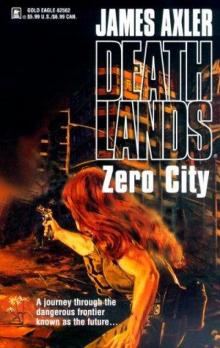 Zero City
Zero City Freedom Omnibus
Freedom Omnibus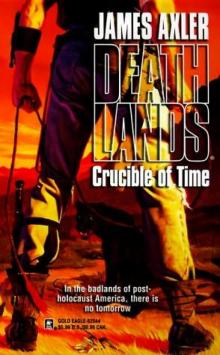 ACrucible of Time
ACrucible of Time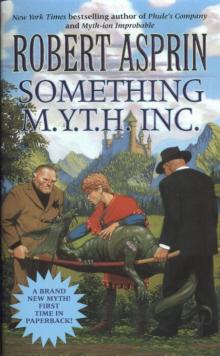 Something MYTH Inc
Something MYTH Inc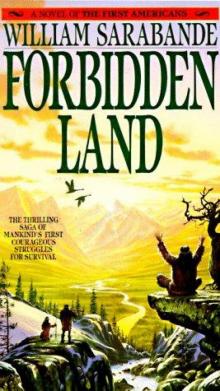 Forbidden Land
Forbidden Land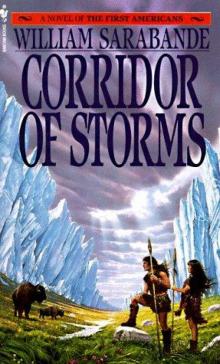 Corridor of Storms
Corridor of Storms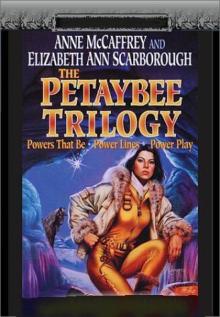 The Peytabee Omnibus
The Peytabee Omnibus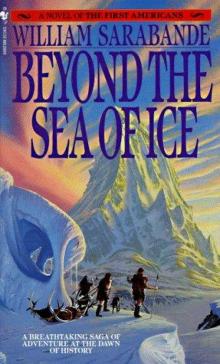 Beyond the Sea of Ice
Beyond the Sea of Ice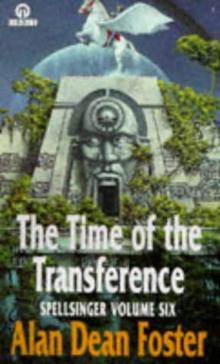 The Time Of The Transferance
The Time Of The Transferance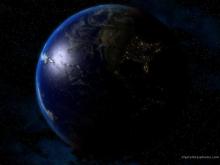 EarthBlood
EarthBlood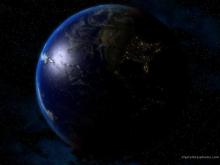 The Lexal Affair
The Lexal Affair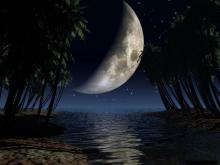 The Web
The Web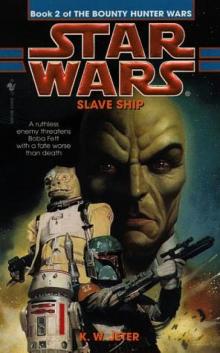 Slave Ship
Slave Ship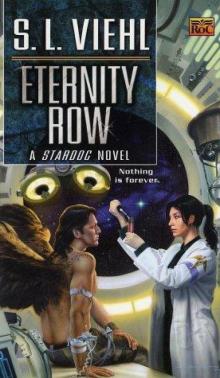 Eternity Row
Eternity Row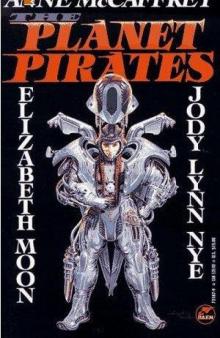 Planet Pirates Omnibus
Planet Pirates Omnibus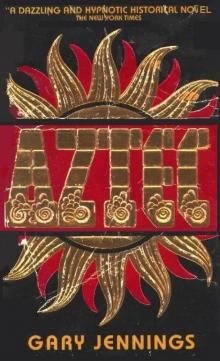 Aztec
Aztec The Awakening
The Awakening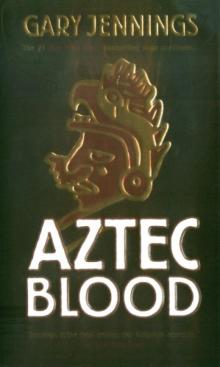 Aztec Blood
Aztec Blood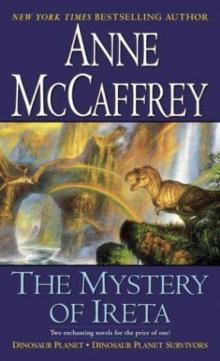 The Mystery of Ireta Omnibus
The Mystery of Ireta Omnibus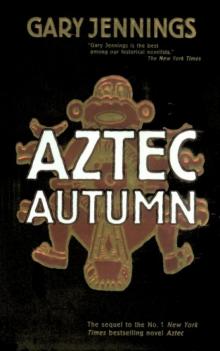 Aztec Autumn
Aztec Autumn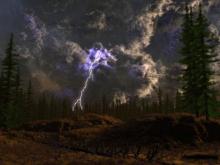 The Savage Horde
The Savage Horde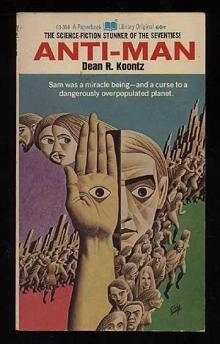 Anti - Man
Anti - Man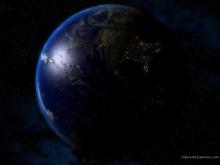 Deep Trek
Deep Trek Starfall
Starfall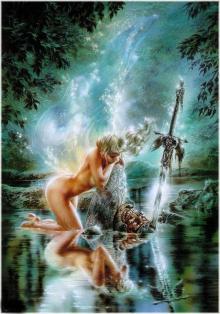 The Paths Of The Perambulator
The Paths Of The Perambulator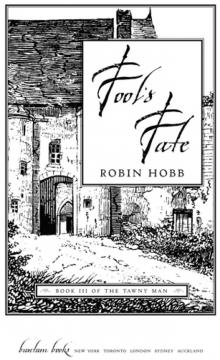 Fool's Fate
Fool's Fate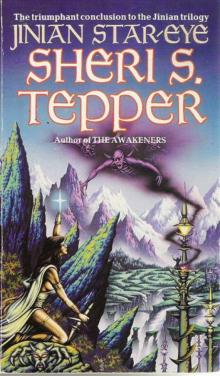 Jinian Stareye
Jinian Stareye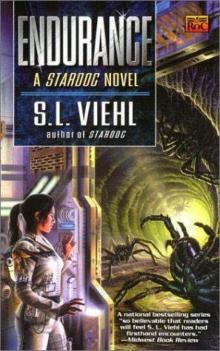 Endurance
Endurance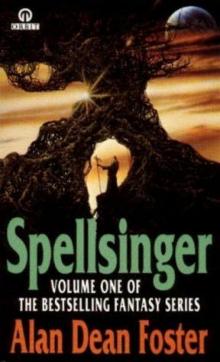 Spellsinger
Spellsinger Hybrids
Hybrids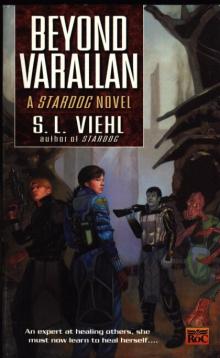 Beyond Varallan
Beyond Varallan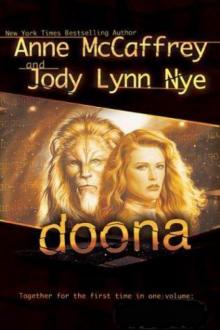 Doona Trilogy Omnibus
Doona Trilogy Omnibus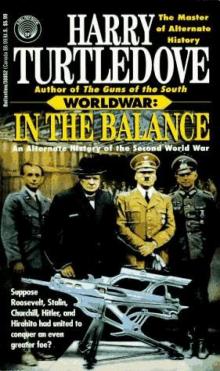 In th Balance
In th Balance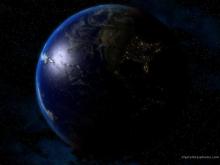 Planerbound
Planerbound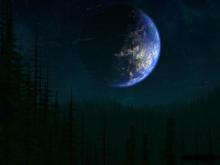 The Nightmare begins
The Nightmare begins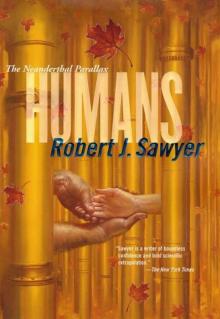 Humans
Humans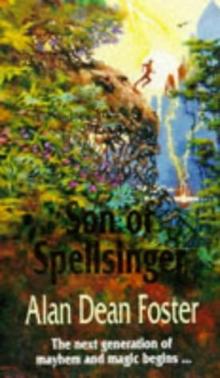 Son Of Spellsinger
Son Of Spellsinger